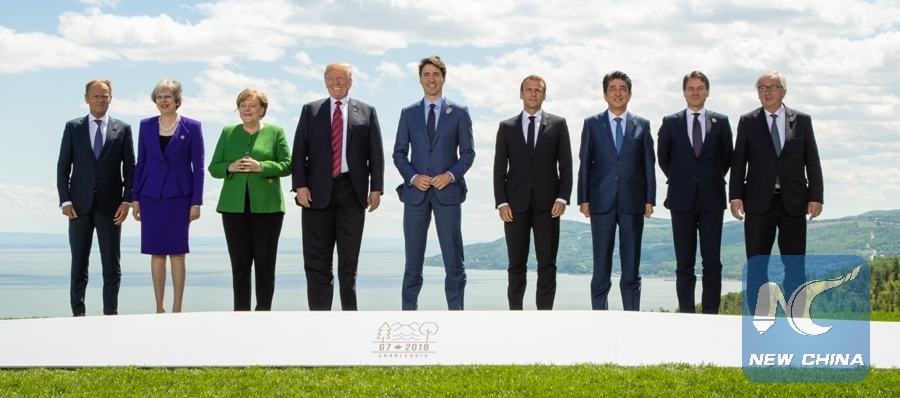
Participants of the Group of Seven (G7) summit European Union Council President Donald Tusk, British Prime Minister Theresa May, German Chancellor Angela Merkel, U.S. President Donald Trump, Canadian Prime Minister Justin Trudeau, French President Emmanuel Macron, Japanese Prime Minister Shinzo Abe, Italian Prime Minister Giuseppe Conte and European Commission President Jean-Claude Juncker (from L to R) pose for a group photo on the first day of the G7summit in La Malbaie, Quebec, Canada, June 8, 2018. (Xinhua/POOL)
By Christopher Guly
OTTAWA, June 10 (Xinhua) -- U.S. President Donald Trump's Twitter tirade against Canadian Prime Minister Justin Trudeau created confusion even among the official U.S. delegation as to whether Trump intended to retract from the communique summing up the weekend summit of the Group of Seven (G7), a scholar said.
"If you just focus on substance, I give this summit a B+ ... The surprise was that it has become a temporary public-relations failure" with Trump's tweets, said John Kirton, the founder and director of the G7 Research Group at the Munk School of Global Affairs at the University of Toronto, in an interview with Xinhua.
"Everybody was trying to figure out if it means the United States is not going to comply with the commitments it made and is withdrawing its political support at the moment - or is it for longer," he told Xinhua.
Despite saying Saturday that his relationship with Trudeau is a "10" and joking with the prime minister at a photo-op the day before, Trump said Trudeau was "very dishonest & weak" on twitter on board his plane as he watched Trudeau speaking at the closing news conference of G7.
The prime minister said that Canadians consider the recently announced U.S. tariffs on Canadian steel and aluminum "insulting" and that Canadians "will not be pushed around."
In a separate tweet, Trump said that "based on Justin's false statements at his news conference, and the fact that Canada is charging massive Tariffs to our U.S. farmers, workers and companies, I have instructed our U.S. Reps not to endorse the Communique as we look at Tariffs on automobiles flooding the U.S. Market!"
Kirton, who holds a PhD in international relations from Johns Hopkins University in the United States, said a G7 communique is "pre-negotiated" with bureaucrats from the members, and then each G7 leader signs off on the document before it is released.
This year's document, which earned high marks from Kirton, addresses gender equality, global security, trade, as well as climate change, oceans and clean energy.
G7 leaders were not in full accord on the document. For example, the United States did not reaffirm a commitment to the Paris Agreement to reduce carbon emissions, and the super power together with Japan failed to endorse a G7 Oceans Plastic Charter.
"No one signs these communiques. They are not legal agreements," Kirton said.
The expert said that he believed Trump's anger was personal toward Trudeau.
"None of the other leaders at the G7 thought that Trump was accurate when he said that Justin lied to him. What the prime minister said at his news conference was not something he did not say to Trump's face in public or in private," Kirton said.
Recalling the history of G7, Kirton said that while this year's G7 summit may be remembered for its acrimonious tone, it is not the first of this kind.
At the 1982 summit in Versailles, France, the irritant was not trade but energy. Then U.S. President Ronald Reagan disagreed with the European G7 members on a proposed 2,800-mile Soviet pipeline that the Western Europe wanted to transport natural gas from Siberia.
"Reagan thought Europe would become dependent on the Soviet Union, which could cut off the gas at any time and leave Europe freezing in the dark," said Kirton.
The U.S. government banned the export of U.S. compressors needed to build the pipeline, which was eventually constructed and is now partially owned and operated by Ukraine.
However, the G7 leaders were still able to reach consensus on their 1982 communique, Kirton explained.

